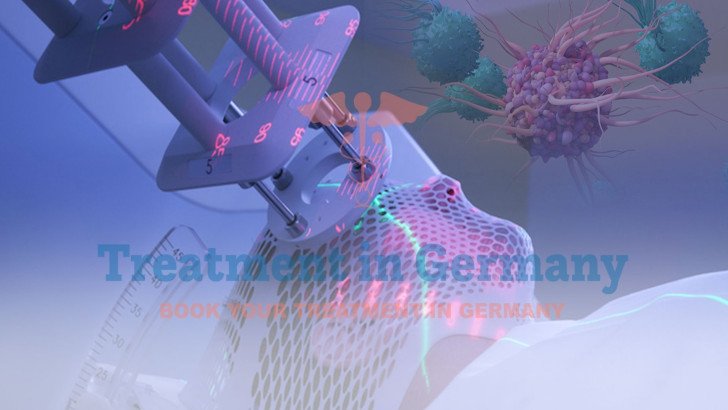
Dendritic cell-based immunotherapy is the administration of individually manufactured vaccines based on the genetic characteristics of a tumor in a particular person.
Radiation therapy remains a cornerstone of cancer treatment, using high-energy rays to destroy cancer cells. When combined with dendritic cell therapy, an innovative immunotherapy, it offers a powerful, personalized approach to tackle cancers like lung, breast, and prostate. Germany’s world-class healthcare system supports innovative cancer treatments, delivered by experienced doctors, oncologists, and specialists.
Radiation therapy delivers precise doses of radiation to target cancer cells, shrinking tumors or relieving symptoms. It is effective for various cancers but may not eliminate all cancer cells, especially in advanced cases. Dendritic cell therapy, a type of immunotherapy, complements this by boosting the immune system.
Dendritic cells are extracted from a patient’s blood, trained in a lab to recognize cancer antigens, and reinjected to activate T-cells that attack tumors. This combination is ideal for patients with cancers resistant to standard treatments, addressing health factors like obesity, diabetes, high cholesterol (hyperlipidemia), and autoimmune diseases. Hospitals use latest research to integrate these therapies, improving quality of life after treatment.
The process of dendritic cell therapy is carefully designed to work alongside radiation therapy:
Radiation therapy uses advanced techniques like intensity-modulated radiation therapy (IMRT) or proton therapy to shrink tumors, making it easier for dendritic cells to eliminate residual cancer cells. German oncologists monitor progress with CT scans or MRI, often combining these with targeted therapy for cancer in Germany or other immunotherapy to enhance results. This outpatient approach minimizes disruption to patients’ lives.
Why Combine Dendritic Cell Therapy with Radiation Therapy
Radiation therapy effectively reduces tumor size but may not address microscopic cancer cells or metastases. Dendritic cell therapy fills this gap by training the immune system to seek out and destroy remaining cancer cells. Doctors choose this combination for:
Hospitals integrate these into cancer treatment, tailoring plans to maximize quality of life after treatment, based on latest research in cancer treatment.
Cancers Treated with Radiation Therapy and Dendritic Cell Therapy
This combined approach is versatile, addressing various cancers, particularly those requiring both local tumor control and systemic immune response. Hospitals use it for:
German oncologists value this synergy for its adaptability, making it a key part of cancer therapy in Germany.
Benefits of Integrating Dendritic Cell Therapy with Radiation Therapy
Combining radiation therapy and dendritic cell therapy offers significant advantages:
Side effects are manageable, with doctors addressing issues like radiation-induced fatigue or mild flu-like symptoms from dendritic cells. Hospitals ensure patient comfort through close monitoring.
Combining with Other Cancer Treatments
Radiation therapy and dendritic cell therapy are often integrated with other cancer treatment options for optimal results:
This integrated approach, supported by latest research in cancer treatment, maximizes treatment success and supports quality of life after treatment.
Complementary Therapies Supporting Treatment
Complementary therapies enhance the effectiveness of radiation therapy and dendritic cell therapy:
These therapies are standard in hospitals, ensuring comprehensive care for cancer treatments.
Why Germany Excels in Radiation Therapy and Dendritic Cell Therapy
Germany is a global leader in cancer treatment in Germany, offering distinct advantages for these therapies:
Conclusion
Radiation therapy, enhanced by dendritic cell therapy, is advancing cancer treatment in Germany, offering effective solutions for cancers like lung, breast, and glioblastoma. By integrating these with targeted therapy, immunotherapy, and complementary therapies, hospitals provide personalized cancer treatment options. Supported by skilled German oncologists, this approach improves quality of life after treatment in Germany.
FAQs
Which hospitals offer radiation therapy and dendritic cell therapy for cancer in Germany?
Many hospitals in Germany and specialized cancer clinics provide radiation therapy and dendritic cell therapy, delivered by experienced specialists
How much does radiation therapy and dendritic cell therapy for cancer cost in Germany?
The cost of cancer treatment for these therapies varies based on the treatment plan and facility.
Can radiation therapy and dendritic cell therapy cure cancer in Germany?
They can lead to remission in early cancers or control advanced cases, improving quality of life after treatment.
What cancers are treated with radiation therapy and dendritic cell therapy in Germany?
Lung, breast, prostate, head and neck, glioblastoma, and melanoma are treated, per latest research in cancer treatment.
Why do doctors choose radiation therapy and dendritic cell therapy for cancer in Germany?
They complement each other, have mild side effects, and enhance cancer treatment options for better outcomes.
Are clinical trials available for radiation therapy and dendritic cell therapy in Germany?
Yes, hospitals offer trials for innovative cancer treatments, including these therapies.
How does radiation therapy and dendritic cell therapy in Germany compare to other countries?
Cancer treatment in Germany is top-tier, with German oncologists using advanced technology and expertise.
How effective are radiation therapy and dendritic cell therapy for cancer in Germany?
They can reduce tumors and extend survival, improving quality of life after treatment in Germany.
Are doctors in Germany experienced with radiation therapy and dendritic cell therapy?
Doctors, including German oncologists, are highly skilled in cancer therapy in Germany, ensuring expert care.
What is the waiting time for radiation therapy and dendritic cell therapy in Germany?
Treatment typically starts within 1-2 weeks.
Can I get a cost estimate for radiation therapy and dendritic cell therapy before traveling?
Yes, hospitals provide cost estimates based on medical records for cancer treatment options in Germany.
For more information or a free consultation, visit our contact us page.
Kindly complete the form below, and our dedicated team will reach out to you promptly. We look forward to connecting with you soon!
Trierer Straße, 56072 Koblenz, Germany

.webp)
 (1).webp)

.webp)
 (1).webp)


.webp)
 (1).webp)

.webp)
 (1).webp)
